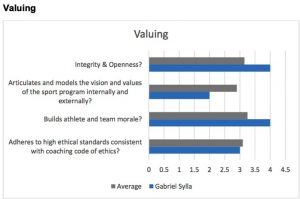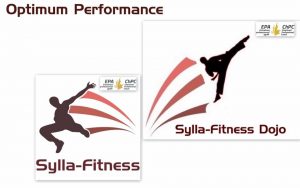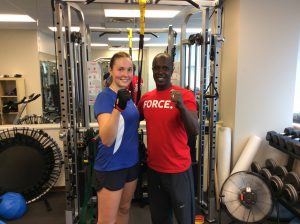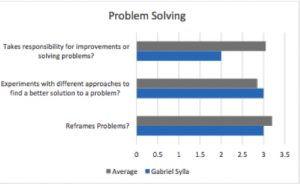Valuing-1

Among the NCCP CORE COMPETENCIES in my book VALUING is the root of them all, the base!
All my decisions as a coach are rooted in my personal Value system. It took me some time to define
those Values, but when i did my advanced coaching Diploma in Montreal, i was brought to reflect and
define them clearly.
The HPCTL programs gives me an opportunity to revisit those values and analyse where i stand today
and ask myself if they have evolved.
Our belief system is at the core of almost everything we do as individuals, for instance, my wife and i
decided to get married because we had the same core life values, like passion, honesty, Solidarity, determination( hard work), Respect and humour (fun)…
I want to first put into context what my role is a coach because, i’m wearing many hats right now:
-I’m an assistant coach on the provincial karate team in Quebec (since 2004)
-I have my own club and i have 1 athlete on the national team
-i’m the strength and conditioning coach for many of our senior national team members
-I’m also an event coach on the National karate team

All these different contexts make my life very interesting
When i was brought to reflect on my core values as a coach, those same values came-up
To be more specific as a coach the values that drive me are:
Passion: Not too many people have, i consider myself very lucky, i want transmit my passion for combat, and strength training to all
the athletes and coaches i work with. I want inspire them to be the best they can be so they can reach their full potentiel
Honesty: I want to be as transparent as possible to the coaching staff and athletes. “What you see is what you get”
No hidden agenda! I think it is the best interest of everybody!
And i want to evolve in a CLEAN sport, that means NO DRUGS to improve performance!
Determination: I always have a never give up attitude in everything i do, and it a high performance sport i think it is crucial
In my coaching i want to model that kind of attitude i practice what i preach everyday!
Reliability: Reliability is key, delivering on every promise i make to an athlete, to the team or the coaching staff
As coach if you are not reliable, you loose credibility period. If you are committed than reliability is no problem.
Fun: Being able to do things seriously without taking myself seriously and i always remind my coaching staff or athletes
when they forget this aspect of training and competition
Education: Because you always have to try to push the limits get up to date on anything that could get your coaching to the next level
We are in a domain that is always evolving. That’s why i did my advanced coaching diploma, and that is why i’m Doing HPCTL certificate.
Knowledge is power! As a coach you can never get to confortable, you have to step outside that confort zone and be open minded
For me the cancer of coaching is RIGIDITY, we have to be flexible and curious and have a thirst for knowledge!
The goal for me this year with my club is to suggest regular discussion about our value system a coaching staff.
Hand out a resume of the philosophy of our dojo to the atheletes and parents
so they can see and understand clearly what we expect from them and how our core value system relates to their athletic context.
I want to give out a questionnaire so can as a coaching staff can have a better idea of their core value system are and what they expect
From the coaching staff and the season in general. I want to give the athletes a voice!
Through Dr. Shaunna Taylor’s class, i confirmed that i that i put the athlete at the center of the equation
and i never want to forget the PERSON inside the athlete!
I Love individuals, that’s why i went into personal training and personal coaching
Every athlete is different and i want to work and focus personally
on him or her , learn to know him or her and help him grow
Most people are wonderful, if you take time to know them well you can do magic!
Every person you look at you can see the universe in their eyes.

Camélie Boisvenue Pan Am games silver medalist
